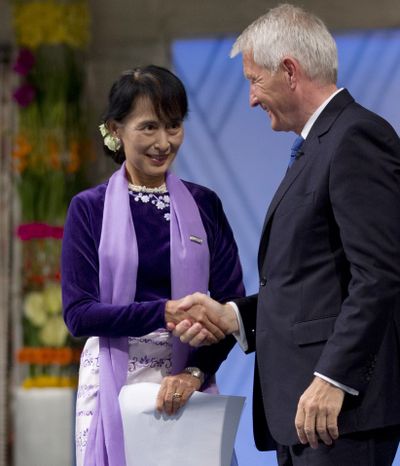’91 Nobel honoree accepts
Freed Myanmar activist won peace prize

LONDON – Twenty-one years after she was awarded the Nobel Peace Prize, Myanmar democracy activist Aung San Suu Kyi made her acceptance speech at last on Saturday during her first tour of Europe since being freed from house arrest.
“When I joined the democracy movement in Burma, it never occurred to me that I might ever be the recipient of any prize or honor. The prize we were working for was a free, secure and just society where our people might be able to realize their full potential,” Suu Kyi said in Oslo, Norway.
The 66-year-old was greeted with a standing ovation in the capital’s City Hall. She spoke clearly and firmly, showing no sign of the exhaustion-induced illness that struck her at an earlier stop in Switzerland.
She recalled learning that she had been awarded the 1991 Nobel Prize by hearing news of it on the radio in Myanmar, also known as Burma. With her movements restricted by the country’s ruling junta, she was unable to receive the award in person; her now-late husband accepted it on her behalf. But the recognition helped ease her isolation, she said.
“It had drawn me back into the wider human community, and what is more important, the Nobel Prize had drawn the attention of the world to the struggle for democracy and human rights in Burma,” Suu Kyi said. “We were not going to be forgotten.”
Her belated speech Saturday was made possible by the Burmese government’s recent political liberalization. Suu Kyi, who spent most of the last two decades under house arrest, was freed in November.
“There have been changes in a positive direction,” Suu Kyi said. “Steps towards democratization have been taken. If I advocate cautious optimism, it is not because I do not have faith in the future, but because I do not want to encourage blind faith.”